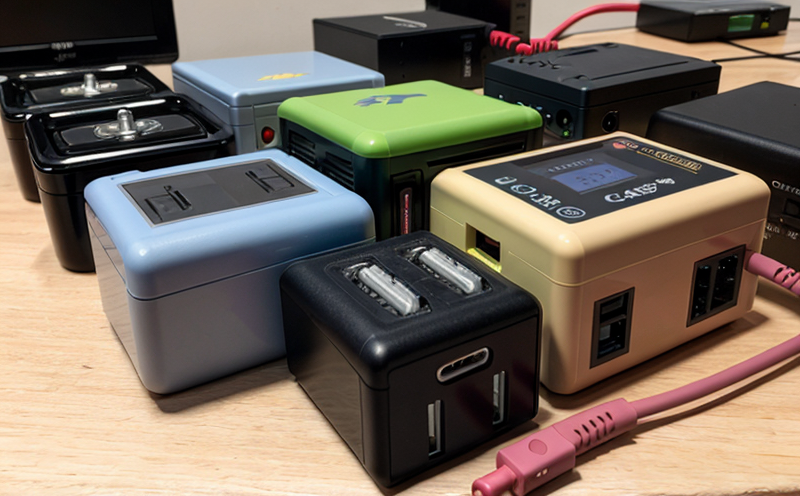Free Fall Testing of Battery Products
The free fall testing of battery products is a critical step in ensuring product safety and compliance with international standards. This form of testing is designed to simulate the real-world conditions that batteries may encounter, such as accidental drops or falls from pockets or bags. The objective is to assess whether the battery's integrity remains intact under such stress without compromising its functionality.
The process involves dropping a battery specimen from a specified height onto a hard surface. The specimen can be either free-falling in an upright position or positioned horizontally, depending on the specific test requirements and the type of battery being tested. This testing is crucial for consumer products that are likely to experience rough handling during transport or use.
The free fall testing procedure follows international standards such as ISO 179:2003 and ASTM D1693-18. These standards provide precise guidelines for the testing apparatus, specimen preparation, and acceptance criteria.
At Eurolab, we use state-of-the-art free fall testers that comply with these international standards. Our testers are equipped to handle various types of batteries, including lithium-ion, nickel-cadmium (NiCd), and alkaline batteries. These testers ensure consistent testing results by providing precise control over the drop height, angle, and impact surface.
The specimen preparation for free fall testing involves ensuring that each battery is in a condition that reflects its intended use. For example, if the battery is to be used in a mobile phone, it should be fully charged or discharged according to the manufacturer's specifications. This ensures that any failures observed during the test are due to the impact and not other factors.
The free fall testing process typically involves multiple drops from different heights, depending on the battery type and its intended use. The standard drop height for a lithium-ion battery is 1 meter onto a concrete or steel surface. After each drop, the battery is inspected for cracks, leaks, or any visible damage that could indicate potential safety hazards.
The results of free fall testing are critical in determining the battery's durability and safety. If a battery fails to pass this test, it may be recalled from the market, leading to costly repercussions for manufacturers. By conducting this testing early in the product development process, companies can identify and rectify any design flaws before mass production begins.
For consumer products that use batteries as an integral component, such as toys, household appliances, or portable electronics, free fall testing is essential. These products are often subjected to rough handling during transportation or accidental drops by consumers. Ensuring the battery's integrity under these conditions is paramount for maintaining product safety and compliance with regulations.
At Eurolab, we pride ourselves on providing accurate and reliable testing services that meet international standards. Our experienced team of engineers ensures that each test is conducted rigorously, adhering to all relevant specifications. By partnering with us, you can be confident in the quality and reliability of your battery products.
Scope and Methodology
| Test Parameter | Description |
|---|---|
| Battery Type | Lithium-ion, Nickel-cadmium (NiCd), Alkaline batteries |
| Drop Height | 1 meter onto a concrete or steel surface |
| Test Condition | Battery fully charged or discharged according to manufacturer's specifications |
| Impact Surface | Concrete or Steel, depending on the battery type and test requirements |
| Repetitions | Multiple drops from different heights as per standard guidelines |
The scope of free fall testing at Eurolab includes a comprehensive evaluation of each battery's performance under specified drop conditions. Our methodology ensures that the test results are accurate and reliable, providing valuable insights into the product's durability and safety.
Eurolab Advantages
- Innovative Technology: We utilize advanced free fall testers that comply with international standards, ensuring precise and consistent testing results.
- Experienced Engineers: Our team of engineers is highly skilled in conducting various types of battery tests, providing expertise and reliability.
- Comprehensive Testing: We offer a full range of services to ensure your batteries meet the highest safety standards.
- Regulatory Compliance: Our testing procedures adhere to international standards such as ISO 179:2003 and ASTM D1693-18, ensuring compliance with relevant regulations.
- Timely Reporting: Our efficient processes allow for quick turnaround times, keeping you informed of the test results promptly.
- Custom Solutions: We can tailor our testing services to meet your specific product needs and requirements.
At Eurolab, we are committed to providing top-notch service that meets the highest standards in the industry. Our expertise and commitment ensure that your battery products are safe and reliable.
Quality and Reliability Assurance
- Precision: Our free fall testers provide precise control over drop height, angle, and impact surface.
- Consistency: We ensure that each test is conducted under the same conditions to maintain consistent results.
- Expertise: Our team of engineers has extensive experience in conducting battery tests, providing accurate and reliable testing.
- Regulatory Compliance: All our tests adhere to international standards such as ISO 179:2003 and ASTM D1693-18, ensuring compliance with relevant regulations.
- Timely Reporting: Our efficient processes allow for quick turnaround times, keeping you informed of the test results promptly.
- Custom Solutions: We can tailor our testing services to meet your specific product needs and requirements.
At Eurolab, we are dedicated to maintaining high standards in quality and reliability assurance. Our commitment ensures that each battery tested meets the highest safety and performance standards.





